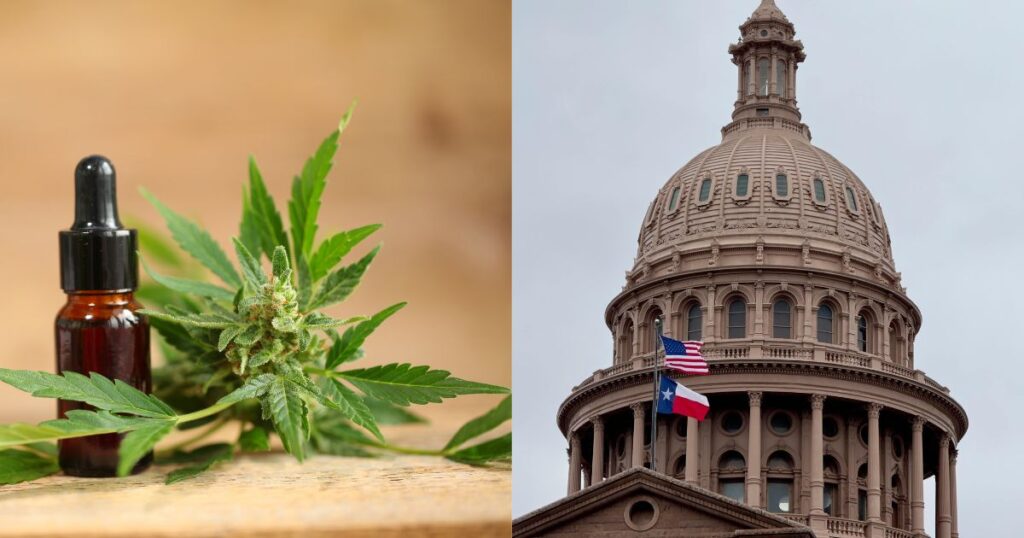Sunday night, Texas Governor Greg Abbott vetoed Senate Bill 3, a measure that would have banned consumable hemp products containing any level of THC, including Delta-8 and Delta-9 THC.
This decision, made just minutes before the veto deadline, placed a temporary hold on a bill that was at the center of intense political and public scrutiny. Governor Abbott, in his veto statement, cited constitutional concerns and the need for a more focused regulatory framework.
Alongside this announcement, he called for a special legislative session to address the future of THC product regulation in Texas.
The bill’s rejection followed months of debate and mounting political pressure from both supporters and opponents of the proposed measures.
Why Governor Abbott Vetoed Senate Bill 3
Governor Abbott’s primary rationale for vetoing SB 3 was the potential for the law to clash with federal legislation. Under the 2018 federal Farm Bill, industrial hemp and its derivatives with a THC concentration below 0.3% were legalized.
Abbott argued that SB 3’s total ban of THC-containing hemp products, even those compliant with federal laws, could create constitutional challenges, potentially rendering the bill ineffective.
He stated in his veto statement that passing such legislation would “put federal and state law on a collision course,” creating more legal uncertainties than solutions.
The governor also expressed concerns about the inability of SB 3 to deliver immediate and effective public safety protections. Abbott commented that if the ban was blocked by courts during legal challenges, it would leave children exposed to the risks that the law intended to address.
“If Senate Bill 3 is swiftly enjoined by a court, our children will be no safer than if no law was passed,” Abbott said.
Rather than supporting prohibition, Abbott advocated for a balanced regulatory framework to address the risks associated with consumable hemp products.
Abbott likened this approach to the regulation of alcohol and other controlled substances, aiming to provide a model that he argues would maximize public safety without disrupting Texas’s large hemp industry.
Political Implications
The veto of SB 3 highlights the tension between Texas’s economic reliance on the hemp industry and growing public concerns regarding safety. Since hemp’s legalization in Texas in 2019, the industry has flourished.
Approximately 8,000 retail businesses are currently involved in the sale of hemp-derived THC products, which collectively generate $8 billion in annual revenue and support around 50,000 jobs statewide.
Many of these businesses, as well as veterans and patients using these products medicinally, lobbied Governor Abbott to veto the bill, arguing that prohibition would harm communities and hinder access to affordable alternatives for pain management and treatment.
However, SB 3 had strong backing from Lieutenant Governor Dan Patrick and his allies. They argued that banning THC products was necessary to protect youth from products they deemed dangerous, citing anecdotal cases of misuse and overconsumption by minors.
During his advocacy for SB 3, Patrick stated that some high-potency THC products, like edibles and vapes, are akin to “a poison in our public.”
Throughout the legislative session, @GregAbbott_TX remained totally silent on Senate Bill 3, the bill that would have banned dangerous THC products in Texas. His late-night veto, on an issue supported by 105 of 108 Republicans in the legislature, strongly backed by law…
— Office of the Lieutenant Governor Dan Patrick (@LtGovTX) June 23, 2025
Patrick responded strongly to Abbott’s veto, calling the decision a betrayal of law enforcement and families impacted by THC-related harms. “the families who have seen their loved ones’ lives destroyed by these very dangerous drugs, leaves them feeling abandoned,” Patrick tweeted on Monday morning after the announcement.
A Special Legislative Session Ordered to Address Senate Bill 3
To address the issues at the heart of Senate Bill 3, Abbott has called for a 30-day special legislative session beginning July 21, according to the Texas Tribune. During this session, lawmakers will revisit CBD and THC regulations in an attempt to craft legislation that balances public safety and economic viability.
The special session’s agenda also signals a shift toward tailored, enforceable regulations rather than an outright ban. Some key points for potential legislation mentioned by Abbott include:
- Limiting access for minors through stricter packaging and sales restrictions.
- Regulating the location of retail operations, such as barring stores from operating near schools.
- Establishing mandatory testing for THC products to standardize potency and ensure safety.
- Enhancing penalties for marketing THC products as candies or items designed to appeal to children.
The session will likely reignite tensions among industry advocates, prohibition supporters, and those favoring regulatory compromise.
The legislative outcome could reshape the future of Texas’ hemp industry, with immediate implications for small businesses, medical patients, and state tax revenues.
A Divided Future for Hemp in Texas?
Senate Bill 3’s veto showcases a larger debate shaping Texas’s approach to cannabis and hemp legislation. For supporters of prohibition, stricter controls remain vital to way they see as curbing “perceived risks”.
For opponents, including those in the industry, developing a sustainable regulatory model without resorting to criminalization remains the priority. Governor Abbott emphasizes regulation over prohibition, aiming to strike a middle ground—but it remains unclear whether this approach will satisfy competing interests.
With the eyes of the nation on Texas, the results of the special session could set a precedent for other states grappling with similar issues. Stakeholders on all sides of the debate will no doubt continue to press for their vision of a cannabis and hemp landscape that balances public safety with economic opportunity.

















